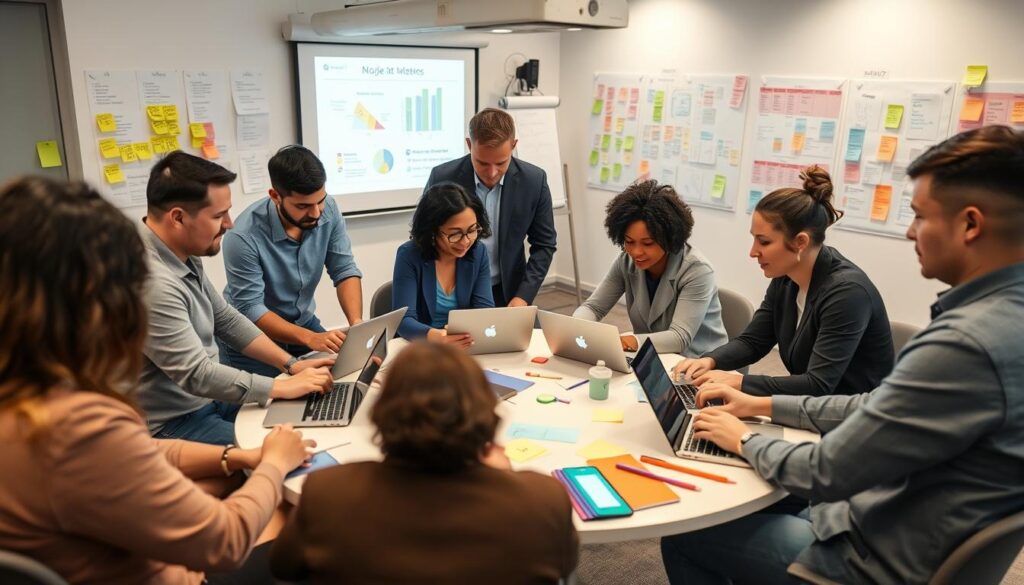Did you know that thousands of workshops focus on the business sector? A whopping 1,341 courses are just for business. This shows how much people want to improve their skills. In today’s fast-changing work world, learning new things is key.
It helps both you and your company grow. It makes you better at your job and helps your company stay ahead.
Looking for ways to boost your career? These professional skill building workshops offer the tools you need. They help you deal with the challenges of different industries. By taking part, you can move up in your career and make your company stronger.
Key Takeaways
- The business sector boasts the highest number of skill-building workshops available.
- Professional development training helps both individuals and organizations thrive.
- Career development training leads to new opportunities and advancements.
- Advanced skills workshops are tailored to meet the demands of evolving job markets.
- High demand exists for beginner-level workshops, ensuring inclusive learning.
- Certificates from these workshops signal commitment to continuous learning.
- Networking opportunities in workshops enhance professional relationships.
The Importance of Professional Development
In today’s fast-paced work environment, professional development is key for both individuals and organizations. Employees see that learning new skills through workshops can help them tackle new challenges and adapt to new technologies. A big 74 percent of employees feel they could do more if they had more development chances.
Investing in training not only helps employees grow but also keeps top talent. This makes a big difference for business success.
Enhancing individual skill sets
Professional development workshops help individuals improve their skills for their career paths. By focusing on specific training, I can boost my expertise and versatility. Studies show that learning new skills can greatly boost my confidence and credibility at work.
However, many professionals don’t update their skills. Shockingly, 33% don’t seek any development opportunities.
Boosting organizational productivity
Organizations that focus on professional development see big gains in productivity. Providing training programs can significantly improve employee performance. It’s been found that companies that invest in staff development attract more talented people looking to advance their careers.
This focus leads to a more efficient workplace. It creates a culture that values learning and growth.
Improving employee retention rates
Investing in professional development is a smart move for keeping employees. An amazing 94 percent of employees say they’d stay longer if their company cared about their growth. Offering chances for advancement can greatly reduce turnover rates.
Turnover can cost a lot—up to 16% of an employee’s yearly salary. So, creating a supportive environment for development boosts loyalty and attracts new talent.

What Are Skill Building Workshops for Professionals?
Skill building workshops for professionals are structured programs. They aim to improve specific skills needed for career growth. These workshops focus on enhancing practical skills, leadership, and communication.
In today’s world, 59% of HR leaders see the importance of these skills. This shows the growing need for such training.
Definition and objectives
These workshops cover various training formats. They address the latest industry skills. Organizations struggle to keep up with these changes, making continuous education crucial.
The main goals of these workshops are:
- To improve individual skills needed for the job.
- To enhance teamwork and communication for collaborative projects.
- To prepare professionals for their industry’s changing demands.
Types of skill building workshops available
There are many types of advanced skills training. Some popular ones include:
| Type of Workshop | Description |
|---|---|
| Communication Skill Simulations | Practical exercises focusing on interpersonal communication and conflict resolution. |
| Problem-Solving Serious Games | Interactive activities designed to enhance critical thinking and innovation skills. |
| Executive Coaching | One-on-one sessions aimed at developing leadership qualities and strategic thinking. |
| Professional Development Courses | Structured learning experiences that provide in-depth knowledge in specific areas. |
| Self-Paced Micro-Learning | Flexible learning modules that allow individuals to build skills at their own pace. |

Benefits of Participating in Workshops
Joining career advancement workshops can really help you grow in your career. These events allow you to learn new skills and gain access to new possibilities. You also get to meet and work with experts and your peers.
Career advancement opportunities
Workshops can show you new paths in your career. They teach you important skills and knowledge. This is great for young professionals looking to start their careers.
Networking and collaboration
Workshops are great for making new professional connections. You can meet experts, educators, and colleagues. These connections can lead to teamwork and mentorship.
Increased job satisfaction
Going to professional development workshops can make you happier at work. Learning new things and feeling more confident can make you more engaged. This can improve your work performance.
Key Components of Effective Professional Development Workshops
Successful workshops in professional development rely on key elements. These elements make learning both enjoyable and effective for participants.
Interactive and engaging learning environments
An interactive setting is crucial for professional growth workshops. Activities, discussions, and problem-solving boost collaboration and knowledge retention. For example, in-person sessions are more engaging than just PowerPoint presentations.
Tailored content to meet industry needs
It’s important to create content that fits specific industry needs. Eric Hunerdosse stresses avoiding generic approaches. Customized training makes topics relevant and addresses individual challenges. “Bite-sized learning” helps learners absorb information better.
Qualified facilitators and trainers
Workshops need trainers with both knowledge and experience. Their credibility greatly affects the workshop’s success. It allows participants to share their experiences and learn from each other. Shuntina T. notes that flexible training options are vital for different learning styles.
Popular Topics Covered in Skill Building Workshops
Skill building workshops are key for improving workplace skills. They cover important topics to boost both personal and team performance. Taking part in these workshops can greatly benefit you, from better communication to learning industry-specific skills.
Communication and conflict resolution
Good communication is vital in any work environment. Research shows that 24% of employees might fail their team due to poor communication. Workshops on communication and conflict resolution help people deal with challenges. This leads to a better team atmosphere and stronger relationships.
Leadership and management skills
Many workshops focus on leadership and management. These sessions last about six months and offer deep training. They help develop leadership skills, preparing people for managerial roles.
Technical skills and industry-specific training
Workshops also focus on technical skills for specific industries. These courses keep professionals up-to-date with new tools and technologies. Learning these skills makes employees more adaptable and valuable to their teams.
Choosing the Right Workshop for Your Career Growth
Choosing the right workshop is key to growing in your career. First, you need to find out what skills you lack. This helps you know what areas to focus on. Then, you should research different workshops to see if they match your career goals.
Looking at what others say about the workshops is also important. This way, you can make sure the workshop will give you valuable skills and training.
Assessing your skill gaps
Understanding your talents and shortcomings is the first step. A Gartner study shows that 58 percent of workers need new skills to do their jobs well. Knowing this helps you pick the right workshops for your career.
Researching workshop providers
Once you know what skills you need, start looking for workshops. Look at what each workshop offers. Check if they cover skills like communication, leadership, and technical skills. This helps you find a workshop that fits your career goals.
Consider these things when choosing:
- The instructor’s credibility and experience
- The types of workshops available, like online or in-person
- What others say about the workshop
Evaluating outcomes and feedback
It’s important to look at what others say about the workshops. For example, 91 percent of people who took Harvard Business School Online courses said it helped their careers. Seeing how much people earn after taking these courses can also help.
Think about these things:
| Workshop Aspect | Importance |
|---|---|
| Participant Reviews | Indicate satisfaction and relevance of content |
| Instructor Credentials | Impact on learning experience and perceived value |
| Company Sponsorship or Endorsement | Reflects industry recognition and trust |
| Flexibility in Schedule | Enhances participation and accessibility for busy professionals |
How Organizations Can Foster a Culture of Continuous Learning
Creating a culture of continuous learning is key for growth and innovation. Workforce development seminars and professional training are crucial. They give employees the skills they need and encourage them to grow professionally. A supportive environment boosts employee engagement and makes these programs more effective.
Providing resources and support
To foster a culture of learning, organizations must provide plenty of resources. This includes:
- Online courses with flexible schedules
- Workforce development seminars tailored to different needs
- Structured professional development training programs
- Workshops on relevant skills
When employees have the tools they need, they feel empowered and engaged. Companies that support continuous learning see better retention and happier employees.
Encouraging employee participation
Getting employees involved is key to success. Here’s how to encourage participation:
- Incentivize attendance in workshops and seminars
- Explain how professional development benefits employees
- Let employees choose relevant training programs
Companies that focus on employee engagement see lower turnover and higher productivity. A Gallup report shows a 21% profit increase in companies with highly engaged workforces.
Measuring impact and success
To see if workforce development strategies work, organizations must measure their impact. KPIs, or key performance indicators, are helpful for tracking:
| Metric | Purpose | Measurement Method |
|---|---|---|
| Employee Engagement | Check overall satisfaction and involvement | Surveys, Focus Groups |
| Skill Acquisition | See knowledge gained from training | Tests, Assessments |
| Performance Improvement | Find out if productivity changes after training | Performance Reviews, KPIs |
By regularly checking the return on investment from learning programs, organizations can see their success. This promotes a culture of knowledge exchange and ongoing improvement.
Success Stories: Transformative Impact of Professional Skill Enhancement
Many people have seen big changes in their careers thanks to professional skills training. These stories show how career advancement workshops can really help. They tell us how folks from all walks of life have improved their skills and changed their career paths.
Case studies from various industries
Success stories from many fields show the power of professional skills training. For instance, in healthcare, workshops on leadership and change management helped teams work better together. From 2014 to 2017, these workshops helped healthcare pros improve their teamwork, leading to better patient care and more efficient operations.
Testimonials from participants
People who took part in these workshops also share their stories. They talk about how they moved up in their careers, thanks to the training. They give credit to the training’s focus and the experts who led it.
Companies like Capital Group and Progressive show how investing in training pays off. They use programs to grow their talent and meet industry needs. This approach helps keep employees happy and reduces turnover.
Conclusion
In the modern workplace, skill-building workshops are essential for professional advancement. They help professionals improve their skills and move up in their jobs. These workshops give people the skills needed for different industries.
They also make workplaces more productive and happy. Companies like Boeing, Walmart, and IBM use these workshops to get better results. They hire people who can do their jobs well with little supervision.
The trend of hiring based on skills, not just degrees, is growing. Places like Maryland are now focusing on what you can do, not where you went to school. This means training that keeps up with the fast-changing job market.
Training in skills is a smart investment. It increases the likelihood that workers will stick with a company. This leads to better retention and more engaged workers.
Looking ahead, professional development workshops are vital. They help close the skills gap and make both individuals and companies stronger.
FAQ
What are skill building workshops for professionals?
Skill building workshops are programs for professionals to improve their skills. They help with career growth by enhancing practical skills and leadership. These workshops are for many industries and roles.
Why is professional development important for employees?
It’s key because it boosts individual skills, helping employees face new challenges. Companies that focus on development see a 24% profit rise and keep employees 30% longer.
What benefits can I expect from participating in skill building workshops?
You’ll get better career chances, make new connections, and feel more satisfied at work. You’ll be more ready and confident in your role.
How can I pick the ideal workshop for my requirements?
First, figure out what skills you need to improve. Then, look at different workshops and read what others say. Make sure it fits your goals.
What key components make a professional development workshop effective?
Good workshops are interactive and fun. They should be relevant to your industry and led by experts. This makes learning effective.
What topics are commonly covered in skill building workshops?
Topics include better communication, leadership, and technical skills. They keep professionals up-to-date with industry trends.
How can organizations support continuous learning among employees?
Companies can support learning by offering resources and incentives. They should also see how learning affects work performance.
Can you provide examples of successful outcomes from these workshops?
Many have seen their careers grow thanks to these workshops. They’ve improved their skills and contributed more to their teams.



